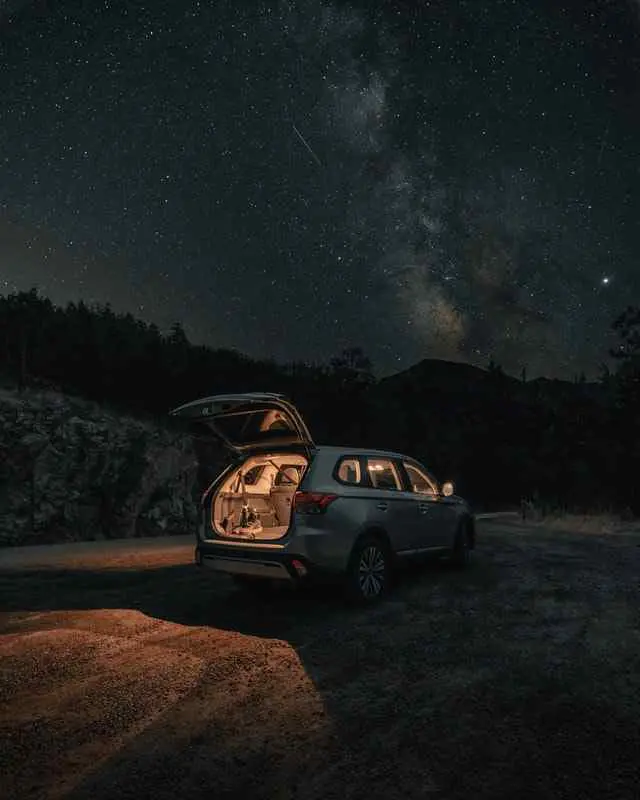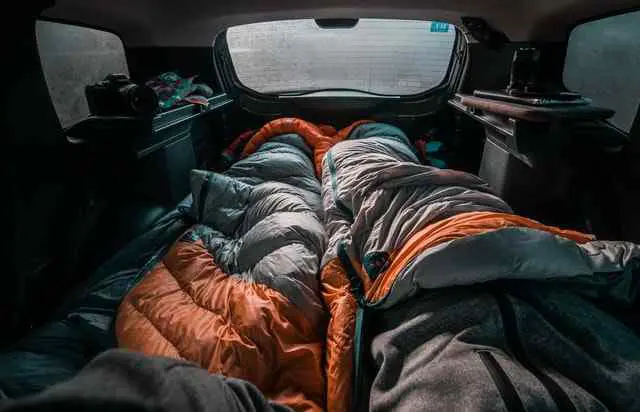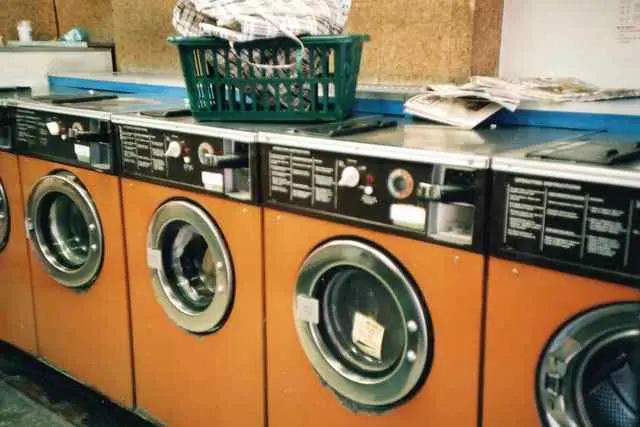This is the ultimate guide on how to live in your car. We cover many topics including preparing food, staying clean, washing clothes, and finding the right car.
You might be considering living in a car to save money, or perhaps you want the freedom to wander and explore?
We will begin by discussing reasons why you should live in your car, then move on to the key things you need to consider before making the leap. These tips will help you turn your vehicle into the perfect home for your adventure.
There is a core section on exactly what car living essentials will be required to ensure you have a safe and comfortable experience.
Will will also answer some frequently asked questions such as whether or not it is legal to live in your car. Many are concerned that it is illegal, and all your questions will be answered in this ultimate guide.
Affiliate Disclosure: Thank you for supporting The Road Trip Expert. When you purchase through links on this site, we may earn an affiliate commission. Please see our advertising disclosure for more details.
5 Reasons To Live In Your Car

With housing and rental costs on the rise, and the average American student graduating with at least $37, 500 in student debt, voluntarily living in your car is becoming an increasingly popular choice for many young adults. Living in your car offers freedom from social burdens like outrageous rent prices and consumer culture while empowering the individual to live a life of complete freedom and possibility.
1. Living in your car cuts out your biggest monthly bill, rent.
The number one reason to choose to live in your car is to save money. Average rent increased in 39 states from 2019-2020 with a 1 bedroom apartment averaging $1,098 per month (World Population Review). Living in your car eliminates that cost and all the costs that go with living in an established residence (think utilities, home decor, and maintenance), and frees up some disposable income.
2. Between work and leisure activities, most people spend very little time in their homes.
If you travel a lot for work or enjoy great adventures in your leisure time, then living out of your car is a great choice for you. The average American spends around 1 hour a day commuting to/from work (U.S. Census Bureau) and collectively took 466.2 million domestic trips for business (Condor Ferries, U.S. Tourism & Travel Statistics), all-time spent away from home. If you enjoy an outdoor or social lifestyle, chances are you aren’t spending time sitting at home out of work hours anyway.
3. Freedom to wander and explore the world around you.
Living out of your car gives you complete freedom and maneuverability, any place becomes a possibility to live, work, or visit. Without a permanent residence to maintain, you are free to drive out and set up anywhere your car can take you.
If you are planning to live a nomadic lifestyle, check out our ultimate guide on planning a road trip.
4. Set yourself free from a consumerist lifestyle.
When you live out of your car, you can enjoy a minimalist lifestyle; As Chuck Palahniuk said in his book Fight Club, “The things you own, end up owning you”. America is known around the world for its insatiable consumer appetite; living out of your car encourages you to get back to basics and to focus on what is really important to you. Who knows what you could learn about yourself, or what experiences you could have, with so much saved time and money?
5. You are already paying to maintain a reliable car.
Chances are, you already have a car that you are maintaining to run reliably and get you everywhere you need to go, so you don’t really need to maintain an apartment as well. There is no reason to hand over the vast majority of your paycheck for a place to sleep when, with a little life adjustment, you can live out of your car
5 Things To Know Before Living Out Of Your Car

A growing number of young adults are bucking tradition and making the decision to live out of their cars. There are a lot of perks to living out of your car, like saving money and enjoying a bracing sense of freedom, but you will need to rethink some basics; like what to do about your mail, your morning routine, and how to spend all that alone time.
1. Be prepared for a sharp learning curve.
There is going to be an adjustment period when you first start living in your car, so be kind to yourself and make sure you have a support system in place. There is going to be some culture shock involved so have a couple of people or places you know of ahead of time that you can go to recharge and remember all the reasons why you made this decision.
2. You will need to be the most organized you have ever been in your life.
Living out of your car sounds like a wild and free adventure, but being organized is necessary to successfully (and enjoyably) live in your car. Write down your daily routine (for both workdays and free days) and translate each part of your routine to a car-friendly version. You will need to scout out places close to work, or family/friends that you can park your car overnight and whereabouts you can regularly shower and use the bathroom.
3. Living in your car is closer to living in the natural elements.
The weather is real and a car is not a building, so have a plan for dealing with extreme weather. On hot/sunny days, you’ll need to find a way to keep your car cool without compromising your safety, and on cold/freezing days you’ll need to make sure you’re warm enough or have a place you can stay with a little climate control.
4. Know the law, know your rights.
Living in your car isn’t illegal and there are plenty of legal options in terms of where to sleep, cook, and shower. Know the law, know your rights, and don’t be afraid to get plugged into some online communities that can help you navigate your new lifestyle. If you are setting up permanently in a specific area or just spending a few days before moving on to the next stop, get to know the local business owners and residents, the bigger the community you build the more options you have.
We’ve got a full article explaining where it is legal to sleep in your car.
5. Stay in touch with your mental health
You are going to be spending a lot of time on your own in a small space, so have a plan to stay connected and fulfilled. Have regular commitments with friends or loved ones (as little or often as your needs require), know some great outdoor spaces where you can walk or spend an afternoon, and organize ways you can still do your favorite lazy day activities in your car.
Finding The Right Car To Live In

Your car is about to become your new home, so if you don’t already have a car that can stand up to the task, it’s time to invest. You definitely want a car that is reliable, easy to maintain, and has enough space to fit you and your belongings. Lean into your living needs rather than something that has speed or “aesthetic”.
1. Know your budget and how much the car costs to run.
Consider how much money it takes to run the car, you don’t want to pay a premium for a trendy bus when your mom’s reliable mini-van will do. Consider the cost of oil changes, filters, brake pads, spare tires, whatever you can think of. All cars cost money to run, but some manufacturers can back you into a corner by requiring the car to come specifically to the dealership for simple maintenance.
2. Sleeping Space
The main thing your car will be for outside of mobility is sleep, so make sure you have removable or foldable back seats. Consider your height and weight and preferred sleeping positions. Bonus points if you can budget for something like a van that has an entire space you can dedicate to sleep without having to rearrange the vehicle.
3. Tinted Windows
Privacy is key to safety and peace of mind, so make sure you have tinted windows. Not only will tinted windows give you that extra privacy, but tinted windows can keep the car cool on a hot day. If absolute privacy is a high priority for you, consider vehicles like a van that have windowless areas.
4. Entertainment systems and adaptors
You will be spending a lot of evenings in your car on your own, so make sure it has good speakers and entertainment outlets. You’ll want something with a decent radio and adaptors for all your tech.
Keep yourself busy with this list of podcasts to listen to in the car.
5. Sunroof
A sunroof can go a long way to easing the sense of claustrophobia and making you feel connected with the environment outside.
6. Security and Safety
Look for a vehicle with a quality locking and alarm system and know how easy they are or aren’t to break into. You are going to be trusting a larger portion of your life to your vehicle, so make sure the safety features are there too.
7. Know your specific needs and expectations for your vehicle.
You and all your belongings will need to fit in the car at any given time, so make sure you know exactly how much space you need before you settle on a vehicle. Consider things like your height and weight, how much clothing and toiletries you plan to have, where you will keep living essentials like food and cleaning supplies. Good trunk space is vital to your comfort and standard of living.
We break down the best cars, SUVs, rentals, vans, and RV’s in our Best Cars to Sleep In post and give you all the tips for sleeping comfortably.
5 Things To Do Before You Live In Your Car

You will want to get all of your documents and personal planning in order before you officially start living in your car. Once you have acquired the right vehicle for you, make sure your insurance and license are up to date, plan how you will receive your mail, and know ahead of time things like where you will sleep, shower, and maintain personal needs.
1. Organise where you will receive mail.
Before you leave your current address, have a plan for how you will receive mail and packages. Renting a PO box costs between $19 and $75, look up which post office is in your area and use their website to reserve one that is the best size for you. Alternatively, you can ask a friend or family member if they would be willing to let you use their address for mail and official documents.
2. Get important documents up to date.
Make sure all important documents, like your driver’s license and car insurance, are up to date. Anything that is easiest to set up with a permanent address, like bank accounts and gym memberships, should also be done before you head out for car life.
3. Get rid of what you don’t need and find storage for what you want to keep.
You’ll need to do some serious downsizing or find a place to store the bulk of your belongings. Storage units have a wide price range, averaging between $75-$300 per month, so you want to get rid of as much as possible to keep this cost low. Ask if any friends or family members can store the things you just can’t part with for free or at a reduced rate. If you have any valuable items, it is worth investing in a lockbox at your local bank.
4. Translate your daily routine into car living.
Write down your daily routine, both for a workday and a free day, and plan how that translates into car living. Think about your morning and evening routines, like getting ready for work and maintaining laundry and personal hygiene. Consider fun stuff too, like how you can keep up with your hobbies and social life.
5. Know where you can shower or park overnight.
Spend some time scouting out different places to sleep and shower in the city or area you plan to take up residence in. Ideally, you want several safe places to park overnight so you don’t end up in a pattern that could draw unwanted attention to your living situation. If you are living permanently in a particular area, it shouldn’t be hard to organize regular showers.
How To Prepare Your Car To Live In

After you have gotten your life organized in preparation for moving into your car, it’s time to get the car live-in ready. You should make organized sections for things like clean clothes, dirty clothes, toiletries, car maintenance, food, and personal items. Get the car tinted and take it in for full service to be sure that it is in a safe and suitable condition.
Go through the vehicle and mentally mark designated areas for things like a sleeping space, food storage and preparation, and recreation. Knowing that everything has a place will keep you calm and comfortable in your new environment.
Give the car a full service
Give your car a full service and have it checked out for any issues that can be avoided. Fresh brake pads, fluids, oil change, change the filters, the air in the tires, everything under the hood should be checked out. You will be depending on your car for everything, so you want to start off in a good place.
In terms of making sure your car is mechanically sound, a lot of the advice in our article on preparing a car for a road trip will be useful to you.
Install extra security measures
Your car is your new home and you don’t want anything to happen to it. Purchase a steering column lock and any other extra security devices that give you peace of mind.
Tinting
If the car isn’t already tinted, tint it as dark as is legally possible in your area. Tinting means privacy and security. It is also possible to purchase sun shades that you can put up over the windows as an alternative.
Get Organized
Organize the storage areas in your car, like the back seat and the trunk, into specified compartments. Everything needs to be kept separate, especially food so it doesn’t end up getting crushed or leaving crumbs all over everything else. Know what things you need to keep handy (like snacks and wipes) and have designated spaces for them in your main living area. You want to minimize the number of times you come in and out of your car so while you obviously need to use the trunk for storage, you need to have the necessities easy to grab.
Prepare the designated sleeping space
Prepare the area you plan on sleeping in and make sure you and all your belongings comfortably fit while you are in your sleeping position. This is especially important if you have to set up your sleeping space each night by moving things around to lay the back seats down.
10 Car Living Essentials

There will be some initial setup costs as you gather together all of the essential items for living out of your car. The main categories are car maintenance, personal maintenance, and day-to-day living.
Car Maintenance will be all the things you want to have to hand in order to keep your car running smoothly and make sure you don’t get stuck in a tricky situation. These are things like a spare tire and jack, a backup battery, and top-up fluids. Personal maintenance will be things to help you keep up your personal hygiene, like wipes and a handy toiletries kit. Day-to-Day living items will be things like your sleeping kit and food storage items.
1. Back up Battery/Air compressor Combo
A backup battery/air compressor combo is an essential living out of your car item. You don’t want to be caught out with a dead battery or a flat tire so get the right tools to jump your car by yourself.
2. Vehicle Spares
Make sure to have a spare tire and a jack or a tire patch kit. If you will be traveling a lot while living in your car, keep top-up fluids, filters, and spare bulbs; anything you might need to keep your car running smoothly and keep you safe.
3. Powerful Flashlight and headlamp
You don’t want to drain your car battery by turning on the dome lights every time you need to find something in the car at night. A powerful headlamp comes in handy when you need to do a midnight wee in the surrounding forest or a heavy-duty flashlight can double as a self-defense weapon.
4. Earplugs/Eye Mask
Sleeping in your car means you can’t control the environment outside the car. Earplugs and a good eye mask help make the noise and lights of the outside world manageable so you can get some quality rest.
5. Sleeping Amenities
Once you know what kind of sleeping space your vehicle can offer, purchase appropriate sleeping amenities. This can just be a pillow and sleeping bag for the back seat, or an actual blow-up mattress complete with a set of actual sheets.
6. Handy Toiletries
It is best to keep all your toiletries in a discreet and easy-to-carry bag so as not to draw attention to yourself and your living situation. Stick to the basics like shampoo, conditioner, soap, razor, and toothbrush/toothpaste. If you will be living in more rural areas and taking advantage of natural facilities, please use environmentally friendly products.
7. Wipes
Anyone who has lived out of their car for any length of time knows the value of keeping a package of wipes handy. Wipes are the secret to a clean living environment; wipes for personal hygiene and wipes to clean down surfaces.
Regardless of the situation, wipes are definitely one of those essential things to keep in your car!
8. Cooler
A small cooler allows you to store some perishable foods so you don’t have to live off dry goods. This should be kept in the main cabin of the car and opened as infrequently as possible. Topping it up with a cold bottle of water whenever you open it is a great tip to keeping it cool.
9. Water
Have a large store of water in the trunk with something smaller for daily use in the main cabin of the car. Water will come in handy for drinking and washing, and can even be used to top up your car’s coolant in a pinch (though make sure you know how to correctly/safely change your car’s coolant before doing this).
10. Portable Toilet
It is worth investing in some type of portable toilet so that you don’t have to find a restroom every time you need to pee. Depending on your budget, you can get anything from an actual chemical toilet to an opaque plastic bottle with a wide rim.
A lot of the items in our Camping Road Trip Packing List also apply to living in your car. So go ahead and check that out!
10 Tips For Living In Your Car Comfortably

Adjusting to a smaller space will be one of the bigger challenges of living comfortably out of your car, so it’s important to invest in the right vehicle (if you can). Thankfully, the right vehicle is only a small part of living comfortably in your car.
Maintaining your environment, whatever the size, with good organization, healthy habits, and a dependable routine can go a long way to making you feel safe and comfortable in your new environment.
1. Invest in the right car for you
Each individual’s needs, budget, and situation are unique; some people are choosing to live in their car and some are having the choice made for them. If you can upgrade to a vehicle that has the right amount of space and amenities for what you need it to do. If you are stuck with what you got, downsize as much as possible and invest in some creature comforts.
2. Stay Organised
Having a designated place for everything is vital to living comfortably in a small space. Keep things like healthy snacks, water, toiletries, and wipes handy, and things like clothes, cleaning, and car supplies out of the way.
3. Plan Ahead
We cannot stress this enough, planning ahead is the best way to stay comfortable and avoid dangerous situations. Have several overnight options in mind, know places you can regularly take showers/do laundry, and always have a bail-out option.
4. Be prepared for unusual situations
It is likely you will end up speaking to authorities from time to time, so stay calm, know what you want to say, and be respectful. Sometimes you will be moved on by authorities and sometimes you will have to move yourself on because there are drunk people having a fight in the street, but this is ok because you planned ahead and have a list of places to go.
5. Create a comfortable sleeping environment
You should have a designated sleeping space that is different than where you spend waking hours. Make it as comfortable as possible with reclined seats, warm/comfortable bedding. Keep windows slightly cracked when sleeping, but cover them with a blanket or towel to maintain privacy.
We actually have an ultimate guide on sleeping in the car which may be of use to you.
6. Have a daily routine
Having set times you wake up and go to bed give your day structure and break up the monotony of car living. As a bathroom won’t always be readily available, this also trains your body when to expect a restroom break and creates a much more comfortable sleeping and living experience.
7. Entertainment
Have a few road trip playlists for every occasion, happy, sad, calming, background noise, to make the environment feel cozy. Audiobooks and Podcasts are great ways to pass the time or fill the silence in the evenings.
We’ve compiled our favorite list of audiobooks to listen to in the car for those long winter nights.
8. Eat Healthy Foods
A healthy diet with as many clean, fresh foods as possible goes a long way to making you comfortable in a small space. Of course, food storage can be tricky in the car, but keeping things like apples, peanut butter, powdered milk and rolled oats handy is better than bags of chips and cookies.
9. Maintain Hygiene
If you feel fresh and clean, you will be more comfortable living in your car. Plan regular showers, keep wet wipes handy and keep dirty laundry in a sealed bag out of the main living space. Regularly wipe down surfaces and clean up spills.
10. Prioritise Mental Health
To be comfortable in your environment, you have to be comfortable in yourself. Look after your mental health by keeping up with friends and spending as much time out of the car as possible. Have several outdoor spaces you can pass the time and make a plan to keep up with your favorite hobbies. Living in your car doesn’t change who you are or what you love, it only changes where you lay your head at night.
5 Safety Tips For Living In Your Car

Living in your car is an incredible adventure with millions of possibilities and freedoms, but it also means you are taking your safety into your own hands. You will be much more exposed to the world, so be as discrete and unpredictable as possible. Make sure you plan ahead to give yourself as many safe options as possible and keep connected with a loved one or community.
1. Be as discrete as possible
While living in your car isn’t illegal, it is best for your personal safety to be as discreet as possible to avoid any unwanted attention. Limit the number of times you come in and out of your car, especially at night, and make the living area of your car as opaque as possible. Be kind to and courteous of the people and establishments around you so they don’t come to see you as a person of suspicion.
2. Move in unpredictable or immemorable patterns
Don’t sleep in the same spot several nights in a row or have a set pattern of sleeping locations. You can never have enough sleeping spots and if all else fails you should have a few designated safe locations on your list. This means having an emergency budget for a night in a motel or friends/family members in the area who won’t mind letting you use the couch on an odd night.
3. Plan ahead to keep your options open
The more you know about the area you are living in and your personal schedule, the better prepared you will be. Have a long list of safe sleeping spots, park in places that are easy to get out of, and know how long you can reasonably drive before you get too tired. Being prepared decreases your chances of ending up in a situation where you have limited, or no, safe choices.
4. Have a dependable contact you keep up-to-date on your whereabouts
If it is possible, keep a reliable loved one (preferably one with a stable/traditional address) informed about where you are and where you plan to be. Have a system where you send then updated texts or check in with them every night. It’s worth making sure they have a current list of the places you regularly sleep and the details of your car so that if the worst should happen, they know where to start looking.
5. Trust your instincts
If something doesn’t feel right, get out of there and find help. Your safety is the most important thing, so don’t kick yourself if you need to crash with a friend or spend a little extra money on a secure place to sleep. Don’t be shy about writing down suspicious plates or keeping your contact updated if something doesn’t seem right.
Safest Places To Park When You Live In Your Car

Whether you are staying in one area permanently, or plan to be living a more nomadic lifestyle, know the area you are in and have a list of safe places to park. Safe places should be well lit, legal, in a safe part of town, and close to other people you can go to in an emergency.
1. Walmart
Walmart is probably the best-known place to spend the night in your car, but it is also one of the safer options. Well-lit, a 24 hr business with access to amenities and other people, completely legal, and level ground with no high-speed traffic. Though you will have a lot of foot traffic throughout the morning and daytime hours from the shoppers.
Find out what other stores allow overnight parking if you can’t find a Walmart parking lot.
2. Campgrounds
Campgrounds are designed for people to spend the night in. There will be no traffic, plenty of other people around, and a safe place to use the facilities. The cost is usually low, but it can add up if you are relying on it most nights. Campgrounds are usually in more rural areas, so it may not be the best option if you plan on city living.
3. Rest Stops
Rest stops are another place designed for people to stop and sleep, though how long you can legally rest there varies from state to state. Usually well lit and with safe access to amenities, but you will have to evaluate each rest stop individually. You want to be close to other cars, but not too close to the main facility and out of the way of the entrance/exit.
4. Religious Buildings
Many people, regardless of religious standing, find comfort in religious buildings. Religious buildings are usually empty outside of services, so they make for quiet, well-maintained places to park. People who work there are often friendly and interested in helping others, so it’s worth introducing yourself and getting formal permission.
5. Residential Neighborhoods
Residential Neighborhoods in safe sections of town are a great spot as they are usually well lit (but not too bright), an even surface with little traffic during the night, and plenty of people around in an emergency. It is especially safe if you can park near someone you know. While not illegal, it is best, and safest for you, to be discrete around people’s private homes.
Our article on Places you can Legally Park Overnight gives all the details on 10 spots you can legally park overnight.
How To Wash Clothes When Living Out Of Your Car

Keeping your clothes fresh and clean is a great morale booster, if you feel clean, it’s easier to get comfortable. Washing your clothes can be tricky, but as long as you plan ahead you won’t have any problems.
The obvious solutions are friends and families, but you may not want to rely to heavily on the kindness of others. The laundromat is another obvious choice, but anyone who lives without a washer/dryer can tell you, this gets expensive fast. Really, you just need a bucket of water and some detergent and time to let your clothes hang dry.
1. Portable camping clothes washer
You will need: the washing apparatus, Electricity, Batteries, or Manpower (depending on your selection), water, and detergent
Cost: $25-$300 depending on which washer you select.
Dry: You will need space and time to hang dry your clothes
There is an entire range of portable clothes washers available for whatever your budget or needs are. They can run on electricity (best for van/RV dwellers with a generator), batteries, or manpower and come in a range of sizes. Electric/Battery powered can cost between $70 and $300, so a simple man-powered one will be most cost-effective and eco-friendly.
2. Lakes/Rivers
You will need: a body of water, a bucket, biodegradable detergent
Cost: Free!
Dry: you will need space and time to hang dry your clothes
If you live in a more rural area, there might be rivers or lakes nearby that you can use. It is best practice to take water from the river/lake in a bucket and wash your clothes in the bucket instead of directly into the water. Please use biodegradable/eco-friendly detergent as regular detergent is extremely harmful to the environment. DO NOT use salt water as this will ruin your clothes.
3. Bucket of Water
You will need: bucket, supply of freshwater, detergent
Cost: Free!
Dry: you will need space and time to hang dry your clothes
A simple bucket and some freshwater are all you really need to get those clothes cleans. This works best in small loads, so it may be time-consuming to get several loads washed and dried in a day.
4. Friend/Family member
You will need: a good friend or family member who will let you use their washer/dryer
Cost: Free! (though it’s best to bring your own detergent and offer them a little something for their kindness)
Dry: if they let you use their washer, they are probably fine letting you use the dryer!
If you have a friend/family member you don’t mind asking, then using their washer/dryer can be a great way to get a really good clean in. It is best to use this option (if it is available to you) sparingly. Always bring your own supplies and offer to do a little housework or bring a special treat as a thank you.
5. Laundro-Mat
You will need: A bag of quarters, detergent
Cost: $2.50-$10.00 to wash/dry a single load
Dry: all laundromats supply dryers, though they vary in quality.
The national average to wash and dry a load of laundry at the laundromat is $6.20, which makes this the most expensive option. If you don’t have a friend/family member you can go to, we recommend trying to get by on the bucket of water method and doing a big wash at the laundromat once a month. However, if you have the budget and are happy to do so, then grab a bag of quarters and go for it.
Top Tips for Doing Laundry out of your Car
- Use eco-friendly products whenever possible.
- Make sure you have time to let your clothes dry if you aren’t able to use a dryer.
- Smaller loads are best, so wash the essentials (like underwear, socks, and tops) regularly, but save the big stuff (like jeans, trousers, sweaters) for when it really needs a wash.
- Keep dirty laundry in a sealed bag in the trunk to prevent any smells lingering in your car.
Preparing Food When Living Out Of Your Car

Preparing food in the car isn’t as difficult as it sounds, but it is definitely a change from having a full-service kitchen. Eating will be more about what you can make, rather than what you have a craving for.
Foods that require little prep and no white goods (like a fridge or stove) to store/prepare are the easiest/most economical options, but room temperature food gets old. A quality cooler and camping stove are solid investments if you plan on living in your car for a substantial amount of time.
1. Healthy, Easy-to-Grab Snacks
Healthy, easy-to-grab snacks are a staple for keeping energy and spirits up while living in the car. Have a designated bag in the main living area of the vehicle and stock it with things like protein bars, nut mixes, and hardy fruits (like apples or oranges).
Top Tip: When you do splurge at restaurants or fast food places, take a few extra condiments packages to spice up a meal or snack. A packet of the ranch sauce can really turn around a snack of veggie sticks.
2. Easy, Equipment Free Meals
Keep a notebook of easy-to-prepare meals, like sandwiches and salads, that don’t require any space or equipment to prepare. We recommend hitting up the grocery store towards the end of the day when foods are likely to go on sale as their expiry dates approach.
Top Tip: Many foods don’t actually need to be kept cold, especially if you plan on eating them within a couple of days of purchase.
3. Invest in a portable camping stove
Cold meals get old quickly, so it’s worth investing in some kind of portable camping stove. These can run on propane, solar, or electricity and cost anywhere from $20-$100+ depending on your budget.
Top Tip: Having a portable camping stove is great, but pick your moments. Not a great idea to bust it out in a quiet residential neighborhood at 10:00 pm.
4. Food Storage- Dry Goods and Keep-Colds
Food should be kept in its own container to prevent it from being crushed or getting crumbs in your car. It is useful to keep the bulk of food stored out of your main living space, but plan ahead for meals so you aren’t in and out of the car a lot.
A quality cooler is worth investing in so you can store a wider variety of food for longer, and have cold drinks. It should be well insulated and waterproof. Quality coolers can be expensive, especially if they run off your car battery, so consider your needs and your budget before you purchase.
Top Tip: Your cooler should be kept in the main cabin of the car for proper ventilation.
Here’s our Food Essentials Shopping List
- Bread/Bagels
- Fresh Fruit (apples, bananas, oranges, anything that doesn’t need to be kept cold)
- Nuts/Seeds
- Dried Foods
- Cereals
- Pre-Popped Popcorn
- Rolled Oats
- Powdered Milk
- Peanut Butter
- Protein Bars
- Protein Shakes
- Canned Goods (soups, beans, fruit, veggies, or meat)
- Water
How To Shower When You Live In Your Car

Finding a free, hot shower becomes a serious priority when you are living in your car, good hygiene is great for morale. Luckily, there are quite a few places where you can get a free, or affordable shower, whether you are living rurally or in the middle of a city.
There are free public showers to be found in every state or on some beaches. A gym membership is a great way to have regular access to a hot clean shower, and of course, you can always invest in a portable shower for your vehicle.
1. Free Public Showers
Cost: Free!
Every state has some amount of free public showers, though there may not be one close to where you are living. It’s worth looking up your state on the Public Showers Directory and seeing if there is one nearby. You’ll need to bring your own towel and toiletries and definitely invest in some shower shoes.
2. Gym Membership
Cost: Starting at $19.99 a month
A gym membership is a great way to get access to regular, clean, hot showers. Look up the gym most common in your area and see what their prices are like. Planet Fitness is usually the cheapest membership, at $19.99 a month for access to any of their facilities, but if you live near one in particular you can get a membership for that specific location for even less. 24/hr fitness is another great option because there are so many across the country and they are open 24/7.
3. Portable Shower
Cost: One-time cost, $20-$300
A portable shower is easy to keep/store in the vehicle and gives you the freedom to have a shower as often as you like. There is a shower for every price point, but we recommend one that folds away, has a solar heating system, is hands-free, and has enough water storage that you don’t feel rushed. These won’t be the warmest showers and privacy will depend on location.
4. Camp Grounds
Cost: Some places expect you to pay for a night’s camping, others will let you use it for a small fee. Some are coin-operated, so have a bag of quarters handy.
Campgrounds are designed for human living, so most have some type of showering facility, just make sure you check ahead. Many places ask you to pay for a night’s camping in order to use the facility, but some don’t mind as the showers are coin-operated anyways. Make sure you have your towel, toiletries, and a bag of quarters. Most cost about 50 cents for 3 mins of water.
5. Friend/Family Member
Cost: Free!
It is always great to have a reliable friend/family member who doesn’t mind if you stop in for the odd shower. Make sure you bring your own toiletries and leave the bathroom in a better condition than when you arrived, you want to be invited back!
Wet wipes and dry shampoo are staples to get you through those periods when your friend is out of town, you are out of quarters, and it’s just too cold to stand outside under your portable shower. If all else fails, check into a cheap motel and make a little vacation out of it.
We have written a detailed article on Places to Shower on the Road to help you plan for living out of your car.
Living In Your Car FAQs

Can You Save Money Living In Your Car?
Living in your car cuts out your biggest monthly bill: rent. On average, a one-bedroom apartment goes for $1,098 per month. The average American works 34.4 hours per week and spends 5 hours a week in commute. There is no reason to spend the bulk of your income on a bed to sleep in when you probably already pay to run a reliable car.
Is It Illegal To Live In Your Car?
It is not illegal to live in your car, though each state has its own laws about where you are allowed to park overnight and for how long. If you are living out of your car, it is best to remain courteous and discrete to avoid any unwanted attention as you can be legally moved on if you make residents or local business owners uncomfortable.
What Is It Like Living In Your Car?
Living in your car gives you absolute freedom and control over your existence; you can go where ever your car can take you and live your life. However, it is also a lot of organization, hard work, and preparation; nothing will happen for you unless you make it happen for yourself.
Can You Live In Your Car Comfortably?
It will take time to adjust to living a compact life in your car, but with a little creativity and planning, you can live in your car comfortably. If you keep everything well organized, have a designated sleeping space, and maintain your hygiene and mental health, you can comfortably live in your car for an extended amount of time.
How Much Money Can You Save By Living In Your Car?
When Living in a car you can save over $1,337.83 per month on rent, heating, electricity, and water costs. You will also find you spend much less on consumables due to adopting a minimalist lifestyle. The biggest expense when living in a car is food so follow the tips in our article.
Can You Get A Job When Living Out Of Your Car?
You can definitely get a job when living out of your car, but there are some tips to make it easier. Rent a Private Mailbox (as opposed to a PO Box) or get permission to use a friend/family member’s address so you can put a more traditional-looking address on your applications. Organize showers before interviews and keep interview clothes clean and wrinkle-free. Remain discrete about your living situation.
Disclosure: Some of the links in this article may be affiliate links. This means I earn a commission if you make a qualifying purchase, but this is at no additional cost to you. Thank you for supporting The Road Trip Expert.


